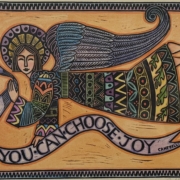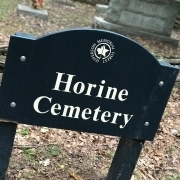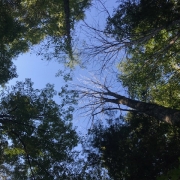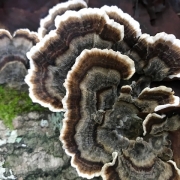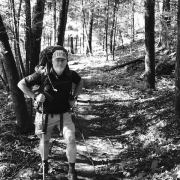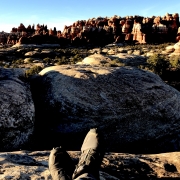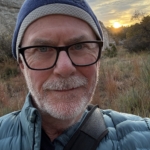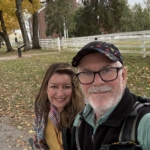Happiness is a Choice | Healthy Aging Series: S12 E6
Disappointment Doesn’t Always Lead to Disaster
My son and I were backpacking in Canyonlands National Park this past month. I was probably carrying 70 pounds in my pack due to the extra water and camera equipment. I’m sure he was carrying about the same weight. Our plan was to backpack 1 1/2 miles to the first campsite. We did that just fine. Big Spring campsite 2 (BS 2). The next day was a 6-mile backpack through Lost Canyon to LC 2. Keep in mind, we were carrying 70 pounds, and then the Utah heat was close to 80°. Plus, we were in and out of Big Spring Canyon and in and out of Wooden Shoe Canyon. So, that 6 miles was a hard 6 miles.
We were getting tired, both physically and mentally. As we approached LC 2, we saw lots of water, good water, close to our home for the night. So, imagine how we felt when we walked into LC 2 and there was another backpacker in our site.
I pulled out my permit to show him that this was our site but then realized our second campsite was EC 2, not LC 2, and five miles away. We were at the wrong site. My son and I exchanged glances.
Walking to EC 2 was the same distance as walking back to the parking lot, two hours either way. And there was only an hour and a half of sunlight left, not to mention that both of us were running on fumes.
The right thing to do was to go to EC 2, but the best thing to do was to find an at-large campsite.
Yes, we could have become frustrated, maybe anger, and maybe disappointed, but it wasn’t a disaster. Jeez, talk about being a mental doofus.
But we maintained our equilibrium, did not become despondent, and decided to find a campsite that, though maybe not legal, was home for the evening.
Happiness is Determined by Environment?
Opportunities come our way every day to test us, to test our resolve, and to test our emotional stability.
So what’s a person to do? Can we be happy despite all the wear and tear that life throws at us?
I write a lot about the body-mind connection. I believe that nature has a healing effect on our mind. Does it? Can we be happy by simply acting happy? How about our service to others? Does that work, does that affect our happiness?
I’m sharing some insights from the Harvard Health Annual 2025. This episode focuses on an article titled, “Mood Boosters.” (Pages 45 through 46). The title I’ve chosen for this episode is, “Happiness is a Choice.”
What is happiness?
While my son and I were backpacking in Utah, we kicked that question around a little bit. The problem is, we decided, happiness means something a little different for everyone. I was watching an interview with the shaolin priest, Shi Zheng Yi (by the way, a very fascinating individual).
He was asked: “Are you happy?”
There was a pause, and then he answered, “That’s a difficult question.”
Is it?
OK, I get it. It’s a loaded question or a loaded word, you know, happiness.
Sometimes I’m happy, sometimes not. I can be happy about a lot of things and sad about other things, or other aspects of what’s going on in the world today, all at the same time.
Shi Yeng Yi continued by saying, “I’m not searching for happiness, I’m searching for peace.”
I get what he’s saying. I’m seeking peace as well. There’s confusion about the word happiness because we make it confusing. Somehow happiness has gotten a bad rap, maybe it’s a western thing, because eastern religions focus more on peace. But the question still remains.
Are you happy?
I would say, yeah, I’m happy and of course I would want to list all the disclaimers, all the “yeah buts,” and all the “yes ands.”
I know, it’s complicated so maybe it’s better just to do a fill in the blank. Don’t you want to be __________?
Contented
Satisfied
At peace
Fulfilled
Gratified
Well-pleased
I could go on, and you can Google synonyms for the word ‘happiness’ for yourself.
What if, and I’m asking, what if, you want to be _________ (fill in the blank)? You know, what if you wanna be happy?
Is there anything a person can do to affect their mood in a positive way?
Surely, and don’t call me Shirley, we all would agree there is something, even if it only moves the happiness-meter a smidge, there is something that we can do to improve our moods.
I also think we all would agree that some of our misery is self-manufactured.
So what does the Harvard Health Annual 2025 suggest for lifting our spirits, even if they avoid using he H-word?
The Mark Neese Maxim
First, you get the Mark Neese-Maxim, or the one that was coined by Harry Stack Sullivan, many years ago, “It’s sometimes easier to act yourself into a way of feeling, then to feel yourself into a way of acting.”
I added the word sometimes because I like to hedge my bets and anticipate someone responding with, “Always?” This always works? My response would be, “Mostly it does.”
The core idea is acting, doing something, even if you don’t feel like it. Acting can lead to a shift in your emotional state, rather than waiting to feel a certain way before you act.
In clinical terms, this is called Behavioral Activation. If you want to be happy, consider doing the things that happy people do.
The Harvard Health Annual 2025 suggestions:
1. Take care of your body. Exercise. Eat well. Get a good night’s sleep. Blah, blah, blah. You’ve heard this a million times!
The HHA 2025 reviewed more than 1000 trials published in 2023 by the British Journal Sports medicine. It found that, compared with people who were sedentary, those who engaged in regular physical activity, like walking, resistance training, Pilates, and yoga, reduce their anxiety levels and improved their moods.
Your body and mind are so closely connected that they catch each other’s diseases. And the reverse of that is true as well. It’s not an accident that active people feel better.
2. Nature Therapy.
I constantly refer to the interview that Tim Ferris (Tim Ferris Podcast) did with Art De Vany, who I consider a nutritional Sage or Guru. Ferris asked, “What would you tell someone who is struggling with depression?” And De Vany answered, “Get them out in nature.”
I get outside several times every week. Our vacations focus on the outdoors. We don’t run marathons, or climb 14ers, but we do walk parks, we picnic outdoors, we sit on our front porch swing most mornings. We smell the fresh air. We listen to the birds. We watched the flowers grow in our window boxes. Some call this Forest Bathing. You could call it a lot of things, and I refer to it as nature cleansing. Let it heal you. There’s a YouTube channel by a guy named Harmen Hoek who does what he calls “Silent Hiking.” I’ve watched several of his videos, and they are extremely calming. You can also vicariously experience forest bathing, or nature’s cleansing by watching videos of people getting out into nature.
3. Practice gratitude.
What you practice grow stronger. Pessimism isn’t a personality trait, it’s learned. Pessimists aren’t born, they’re made. If you practice negative thinking long enough, you will become a pessimist.
Pessimism and depression have a bidirectional relationship. They feed on each other. Practice gratitude instead. Gratitude begins and ends with recognizing that there are also good things in your life. Maybe it is that simple. Practice seeing the good in your life.
4. Help others.
“You can reap many emotional rewards through volunteering,” shares the HHA 2025. “The study of 13,000 older adults, published in 2020 in the American Journal of Preventive Medicine, found that people who volunteered at least two hours per week, felt happier and more optimistic than those who didn’t.”
There have been studies that look at church membership and its effects on people’s happiness. Some studies conclude that people who are church members are happier than non-church members. Of course, these studies are fraught with problems.
First, who were the members? Active versus non-active?
Second, what would the studies show if they compared church members with members of other altruistic organizations, or even with people who regularly exercise, or with professions that focus on helping others, like Doulas, Mountain Rescuers, or Social Workers?
I think the takeaway is that people who help others, and yes, that would include active church members, are happier. It connects us with that social part of the brain, and probably activates a dopamine response.
Helping others can be your happiness-drug of choice.
The Harvard Health Annual 2025 article mentions meditation as a pathway to happiness. I absolutely agree and will spend time in another episode on that practice.
Look, no one said being happy is easy. It’s not like falling off a log. It takes effort.
I’m not here to blame anyone who is not happy and say that you have no one to blame but yourself. I’m not saying that.
But I am saying that if you want to be happy, or at least happier, you can do something about it.
I’m not a super big fan of self-help books, but there are a few that can help. You can do a search on Amazon, and you’ll probably have one on your porch by the next morning, not to mention ordering something off Kindle.
Want to feel happier? You might be able to improve your mood with some simple actions. That choice is yours.

